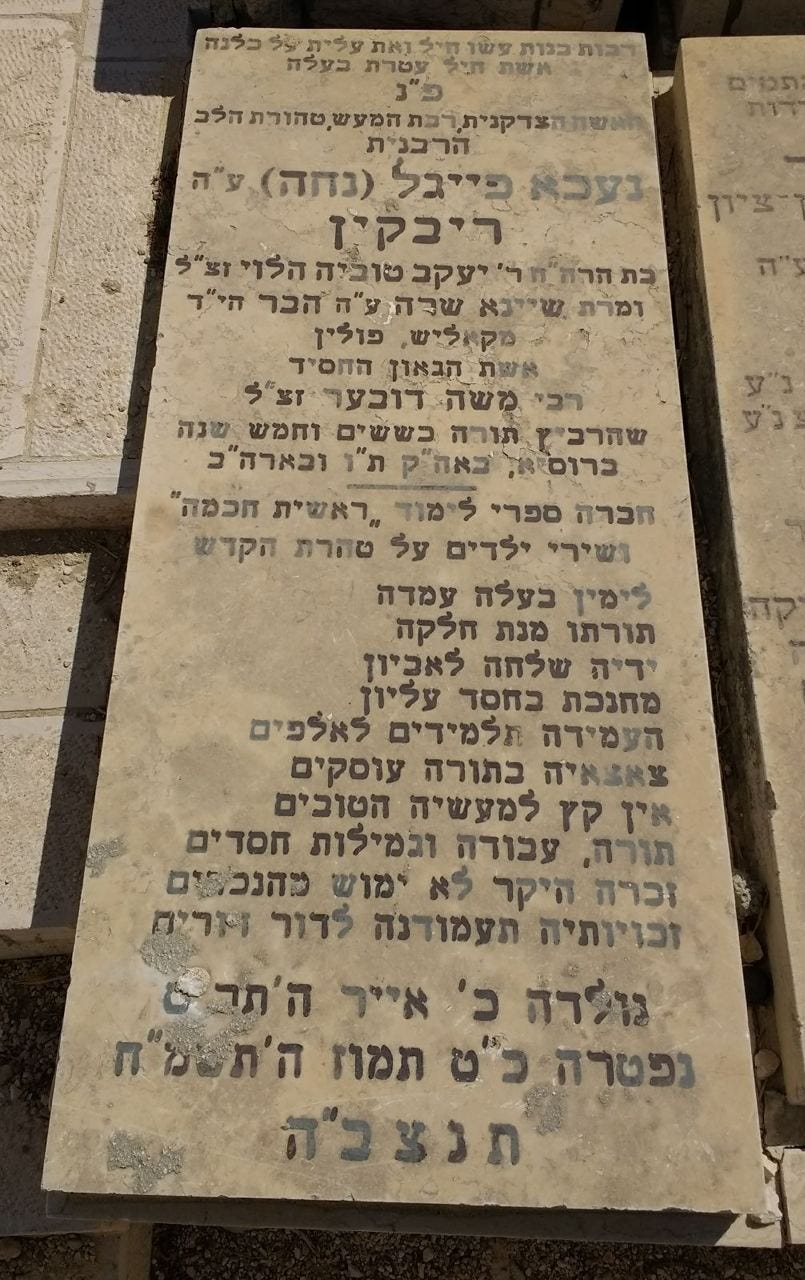On the subject of Sound No. 7 - Sholem Aleichem: The Counterclaims of Barry S. Gourary.

Nacha Rivkin

The photo found in the Schneerson Collection in Moscow.
Nacha Rivkin (1900 - 1988): “Born in Poland, Rivkin and her family moved to Russia during World War I. Already knowledgeable in Hebrew, French, German [I guess Russian, Polish or Yiddish do not count as “real” languages], art and music, Rivkin then moved with her husband - who was a protégé of the Lubavitcher Rebbe - to Palestine, where she studied Hebrew and began studying early childhood education. In 1929, the couple and the family moved to Brooklyn. Upset that there were no girls' yeshiva for her daughter, Rivkin co-founded the Shulamith School for Girls in Borough Park, Brooklyn, where she headed curriculum development and taught kindergarten and first grade. She employed progressive pedagogy and integrated music and art into her curriculum. Her primer and workbook for the teaching of Hebrew had 19 printings. After her death, a group of educators founded the Machon Nacha Rivkin Seminary for Advanced Torah Studies for women in Jerusalem.”
Letter of Chana Gourary to Nacha Rivkin
Письмо Ханы Гурарье из Риги Нехе Ривкиной. The facsimile of the letter:
Translation of the Letter
C. M. Gourary, Riga [the letter is written on Rashag's Stationary: C. M. stands for Самарий Меньделевич or Samarius Mendelivitch Gourary] Address: Krishyana Barona (b. Suvorovskaya) 2, Apt. 3. Tel: 30660 [former Russian name of the street is still listed, renamed after Latvian independence from the Russian Marshall to Latvian Folklorist] Sunday, 17/III 1929
My Dear Natusya! [Nacha=Natasha]
I received your precious letter and was overjoyed. I often think of you. But you know that to actually write a letter one needs a push from outside. I am very?? that you are such a good and soulful person. Dear Natasha, you heard about Musia’s wedding from the newspapers. Musia had to deal with a lot, such a big and noisy wedding is not something that Musia likes at all. Because in the end we are Russian people. The groom, meaning husband, is our second cousin, and they already know each other since 1923, when he was my guest in Kislovodsk. He is much in love with Muisa and appreciates her very much. Our Musia changed considerably for the better, she became much wiser, she is such a well-educated person. She is very popular socially (in society). Two months now they live in Berlin because Musia’s husband is in University there. They are happy. I got your letter couple of days ago ??, it was inside the letter to Sonechka (Sonia) and only few days ago she arrived back from Warsaw. She was there after Musia’s wedding. Thank you so much for the photograph, you are such a beauty. Years did not touch you. Boris Borisovitch still says that you are the most beautiful. You write to Sonia that you are not feeling well (weak). My dear Natusya, past spring, you already turned 28-29, are you allowed to be weak at such an age? Please write, my goldener!
Reflections to the Letter
We have been speaking on mentalblog about the acculturation of the entire Schneerson generation(s). Chana was probably the most traditional of the three daughters. But her Russian penmanship and style are the superb debutante style. And Ramash, even though he was “the last of the Mohicans” (di lezter fun di Mohicans as Zelig Levin used to say), was certainly acculturated himself. Reb Levik writes to his son before the wedding, imploring him to wear a kapote.
Rayatz was putting up a show in Warsaw that felt “foreign” to BOTH the groom and the bride, especially Musia. In Poland Rayatz was building a new Chabad (Did the Rayatz recreate the Chabad movement from scratch?). I think it is a mistake to blame only Ramash for the new and foreign Chabad that intentionally “lost it’s European and Russian Anchor”, it was started by Rayatz, although Ramash took it to the next level.
Poor Musia had to act a theatrical character role in Warsaw, a role that was so foreign and unpleasant to her. Although this would remain her bittersweet fate for her future in Brooklyn. This is perhaps the key to her seclusion, she was avoiding the dramatic mask demanded of her. Someone who was “socially popular”, as Chana Gourary writes, sadly became a recluse. But the wedding production in Warsaw was a small price to pay for the imminent promise of the liberating decades in Berlin and Paris, away from the plebeians in the Easter European ghettos, all paid for by the maamad money from the literally dying communities in Poland and Russia.
The princes and the commoners who shaped the Jewish culture for the entire century were in Berlin then: Gershom Sholem, Menachem Mendel Schneerson, Zalman Rubashov Shazar, Shmuel Agnon, Abraham Joshua Heschel, Haim Arlosoroff, Micha Josef Berdyczewski, Joseph B. Soloveitchik, probably missing a dozen(s) others. Paris and Berlin was such an aristocratic Russian tradition, in a way it was more Russian than the Russia herself.
“Because in the end, we are Russian people!”
P.S. Nevertheless the Russification of the sisters is something to behold and hard to understand honestly. In this letter Chana calls “Natasha's” husband Berl ben Benzion, “Boris Borisovitch”. I have been told there is a letter from Musia to “Natasha” where she calls the Rebbe himself, “Mikhail Lvovitch”! No wonder the Rebbe wanted to lose the “Russian anchor”, he was sick of it at home…





